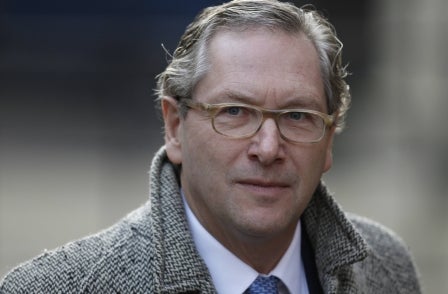
Acting Times editor John Witherow has warned politicians they are at risk of causing a “most tremendous row” with the press over regulation.
The former Sunday Times editor accused the political class of wanting to use statutory underpinning of press regulation as “revenge” for previous press exposures.
He was reacting to Labour deputy leader Harriet Harman’s pledge yesterday to “impose” a system of regulation on the press if the industry doesn’t agree to the Royal Charter.
Speaking on Wednesday night at a Frontline Club event, he said: “I think there is a really worrying mood out there among the establishment and politicians – and it is revenge. These are long-held resentments.
“A lot of them are held against newspapers and journalists. The expenses scandal has exacerbated it.
“And when you get them all combining as they did on that infamous night when they had Hacked Off in there – and they cooked up a deal that is fundamentally against press freedom and freedom of expression – I think there is a mood that they want to punish the press and they think this is their one opportunity in a generation.
“And they are determined to do it. Whether they are going to succeed is going to be interesting.”
He added: “If you want to go back to licensing newspapers, which we haven’t had for hundreds of years in this country, it is going to cause the most tremendous row.”
Witherow also highlighted the fact that the proposals under the Royal Charter, which has been agreed to by all political parties, is causing uproar on a global level.
“I had a bunch of journalists in my office last week and they were saying this is one of the worst things that has happened to them,” he said.
“In Tanzania they torture journalists. In Kenya they are worried about their freedom. In Uganda…
“And they are saying that anything that goes through in Britain will encourage political leaders in these countries to take much tougher lines.”
Also on the panel was Guardian deputy editor Ian Katz who, having not been involved in editors’ negotiations on regulation, was surprised by Witherow’s view.
Katz said he and The Guardian does have “reservations” but pointed out that seemingly very little had changed between what the press had agreed to in terms of regulation and what was presented in the Royal Charter – even after the meeting with Hacked Off in Labour leader Ed Miliband’s office.
Witherow pointed to the changes made to the code committee – which, as they stand he claimed, mean that journalists have lost control over the code to the extent that it can not be defined as “self-regulation”.
Under the final Royal Charter plan the Editors’ Code committee will comprise editors, journalists and members of the public in equal measure.
Witherow also said there were “tiny elements that when you look into the detail over time will make a fundamental difference to freedom of expression”.
Email pged@pressgazette.co.uk to point out mistakes, provide story tips or send in a letter for publication on our "Letters Page" blog

